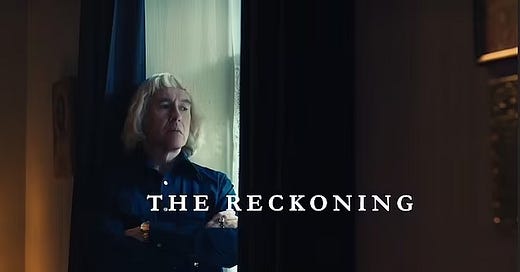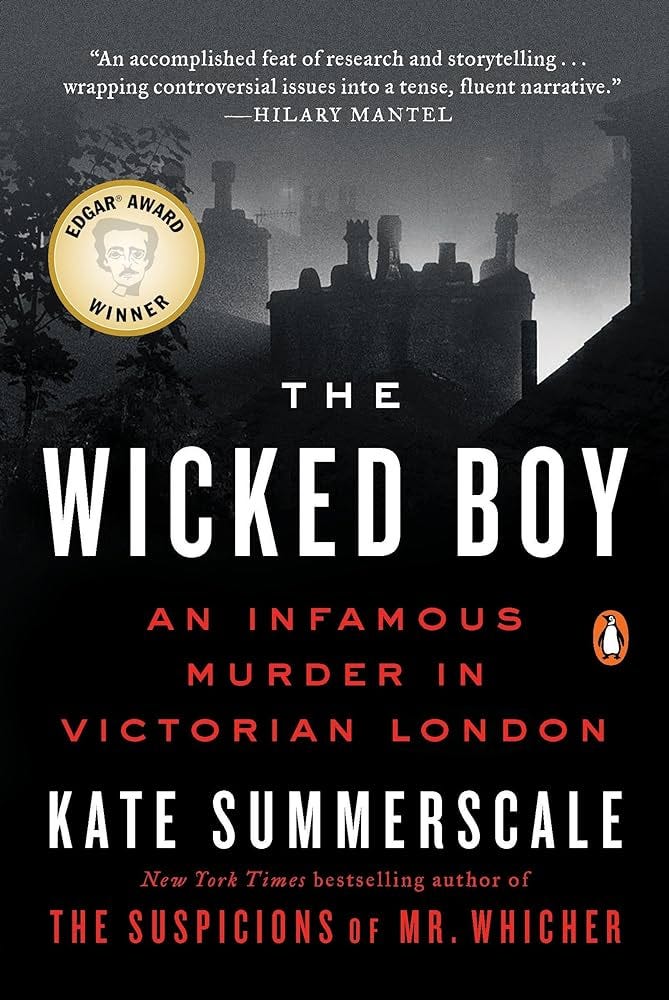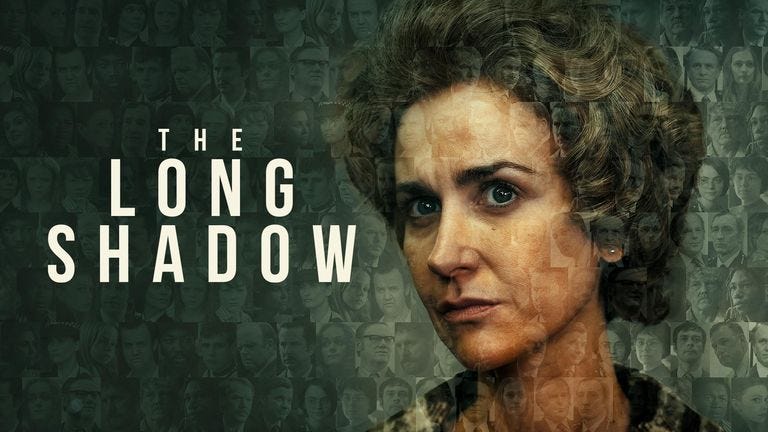True crime drama dominates autumn TV schedules
New shows tackle dark crimes of Peter Sutcliffe and Jimmy Savile
Hello and welcome to this week’s A-B-C of Writing True Stories newsletter.
And hello to all my new subscribers from the past 30 days — you’re most welcome. It’s very gratifying to see there is a growing and eager audience for these posts.
I hope you will find your time here interesting and productive. My aim is to share my experiences, to show you what I’ve learned over more than 30 years as a journalist and writer — yes, the ups and downs — and how I continue to stay enthused and strive to improve.
And I want to hear about your own writing successes and challenges.
A writing community
Long-term, I would love to see the A-B-C of Writing True Stories evolve into a writing community. Writing can be a lonely activity so it’s great to be able to meet with likeminded people and talk about the pursuit we all love.
If you are interested, I want to make this an interactive space where you and I seek to make us all better writers.
So, watch this space: I have lots of plans for the newsletter in the future.
I’ve said it before, but I think writing true stories is the best gig there is.
Whether it’s journalism, a memoir, a biography, a travel book or true crime, all of life is found here.
And there is no bar to entry. Anyone can do it, whatever your background, regardless of age. This latter point is something I continue to emphasise: it is never too late to start writing.
I would even say this newsletter is of benefit to writers of fiction. There is more in common between nonfiction writers and novelists than you might think — so if you know of somebody who might gain something from being a part of this community, please let them know.
The goal is the pleasure of writing… but there might also be a pot of gold waiting
I’m a big believer that the goal should be the sheer pleasure and satisfaction of writing and completing a piece of work. Anything beyond that is the icing on the cake. That said, there are amazing rewards for those with talent and the right story, no matter what stage in your writing career you find yourself.
Just look at some of the surprise blockbuster nonfiction books at the top of the bestseller lists.
One of the most inspiring ones of recent times is Heather Morris, author of The Tattooist of Auschwitz. Her nonfiction career has gone stratospheric in the past couple of years. And she began publishing when she was in her sixties.
This could be you. And if it is, get ready for Netflix to come calling: as I keep saying, there is such demand for great true stories well told.
I’m not making any promises of such success here, but I will say it is not impossible.
True crime: an acquired taste?
As many of you will know, my first book was true crime, and I am currently working on a new book about a real-life murder that I covered as a reporter. I know true crime is not to everyone’s taste, but from what you’ve told me, a lot of you are here because you want to learn more about the genre.
So, that said, in this week’s newsletter I am going to give you my thoughts on the two major true crime dramas set to dominate the UK’s autumn television schedules.
Dark crimes of Peter Sutcliffe and Jimmy Savile
ITV’s already two episodes into The Long Shadow, which examines the terrible impact of Peter Sutcliffe’s reign of terror in the north of England in the late 1970s.
Meanwhile, the BBC unveils the first episode of The Reckoning on Monday (October 9). This is the dark and sinister story of the crimes of Jimmy Savile, the TV personality who was central to so much of the BBC’s entertainment output for decades.
Both shows attracted some controversy when they were first announced, the argument being: is it right to dredge up the traumatic past for the sake of primetime entertainment?
The response to the first two episodes of the Sutcliffe drama, The Long Shadow, starring Katherine Kelly, Daniel Mays, Toby Jones and David Morrissey has been generally positive. The sensitive handling of the subject matter has been acknowledged. Those who have praised this approach include the son of Sutcliffe’s first victim.
Steve Coogan, who plays the reviled Savile in The Reckoning, has said that despite the difficult subject he is happy with how it has been handled.
Both of these shows are markedly different from recent American true crime series glamorising serial killers Ted Bundy and Jeffrey Dahmer.
I sense The Long Shadow and The Reckoning signal a change in how true crime is done on television. I’m not saying these shows are perfect, and I’m sure there will be critics, but I do think the programme-makers’ consideration of how they will affect victims’ families is a major step forward.
Also, with The Long Shadow, the murderer Peter Sutcliffe is very much in the background. It is not about him. It is about the terrible ripple effect of all the harm he caused.
Also significant in this drama is the decision not to include Sutcliffe’s murderous nickname, the Yorkshire Ripper, in the title. This was done as a mark of respect to the families.
Respect for the families
I have some experience in the matter. My book The Jigsaw Murders: The True Story of the Ruxton Killings and the Birth of Modern Forensics is a reconstruction of a historic and landmark double murder case from the 1930s.
My interest was less in the bloody deed than the incredible work by the team of scientists and police officers who developed new forensic techniques that are still in use 90 years later.
I felt it was important to honour the victims and it meant a lot when descendant family members later thanked me for writing it.
The book was optioned for television and is currently being developed as a television drama.
I can see many of the same ethical editorial choices I took being made by the writers and producers of The Long Shadow and The Reckoning: a desire to make their true crime serve a purpose rather than be an excuse to exploit the undoubted easy dramatic entertainment potential of such heinous crimes.
In my view The Long Shadow is much more potent for not dwelling on the killer or the actual murders.
When I wrote my book, The Jigsaw Murders, I took the decision not to include a gratuitous scene dramatising the murder.
There were no surviving witnesses and the killer never admitted his guilt, so there was no documented account of what actually happened.
All I had to work with were the police reports and the findings of the forensic scientists, which were given in court. So I let the reader imagine what happened and when the truth comes later in the book it has more emotional punch. To do otherwise would have been irresponsible.
Journalist and author Kate Summerscale has written two bestselling true crime books, most famously The Suspicions of Mr Whicher, which was turned into a successful ITV drama starring Paddy Considine.
She put it rather well when discussing her book The Wicked Boy: “True crime is ethically precarious, often uncomfortably close to voyeurism, prurience, a fascination with violence, transgression and pain; but it can examine the dark traits that it panders to, and for just this reason it has an unusual capacity to engage with questions about psychology, cruelty, culpability, disturbance, damage, injustice, restitution, fear, pity, grief.”
So when we sit down to watch The Long Shadow and The Reckoning, yes, we are being compelled by clever storytellers but at heart we are being asked to contemplate the dark side of the human psyche.







Having watched all the episodes of The Long Shadow, I was left feeling incredibly angry at the sheer incompetence and lack of compassion of the police (not all of them, but the vast majority of them, particularly those in the upper echelons), and if it were not for the diligence and dedication of those few who really cared, I think that evil man, Peter Sutcliffe, would still be at large.
I felt so sad for the last victim’s family, in particular, although naturally my heart bled for all the victims and their families who have to live with the consequences every day of their lives, which must be horrendous, and if that arrogant man had listened to his team and not become fixated and side-tracked by the hoaxer, then lives could have been saved. I had no idea the police had been so incompetent.
I think the series was incredibly well done and, quite rightly, focused on the victims and portrayed the ineptitude of the police which rightly should have been highlighted.
I will check out your book, The Jigsaw Murders, which I am sure I will enjoy, although personally I prefer to write about fictional murders and my novel, The Mysterious Disappearance of Marsha Boden, is out in March.